How socialism made Venezuela a poor country
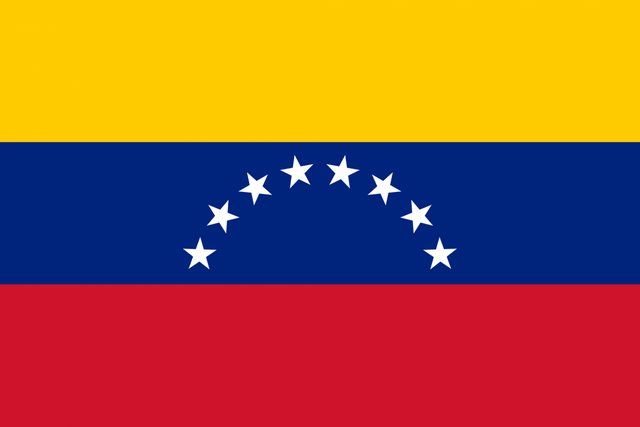
Despite having failed every time it has been attempted, socialism is still incredibly dangerous. Today I will tell you a little story, that of a country that was very rich but thanks to socialism, it is now very poor; Venezuela.
The reason for this post is not to speak of the bad or harmful that is or can be socialism, no, that is more than a century of history, nor talk about its quasi-dictatorial government, scarcity, oil or economic problems.
What I am going to present in this entry is a small graphic comparison of Venezuela's past and present.
Much of what you'll see below is an excerpt from an article by Jeff Desjardins in The Money Project. Of course in the end I will leave the link of the complete article for those who wish to read it complete.
So let's get started!
Venezuela is the country with the largest proven oil reserves in the world with 300 billion barrels (300,000,000,000 barrels), which means that the country has 2 times the reserve of Iraq, 3.75 times the reserves of Russia, 7.8 times the United States and 45.5 times the reserves of Norway.
However, Venezuela is far from being the largest oil producer. With a production of 2.2 million barrels a day, Venezuela ranks 11th, with countries like China and Brazil producing more oil.
In fact, in the last OPEC meetings, while all countries began to cut oil, Venezuela was the only country allowed to increase its production, but today the Venezuelan industry is unable to produce more oil, since the lack of investment in PDVSA plants and facilities mean that the latter is unable to increase its production and even maintain that of previous years.
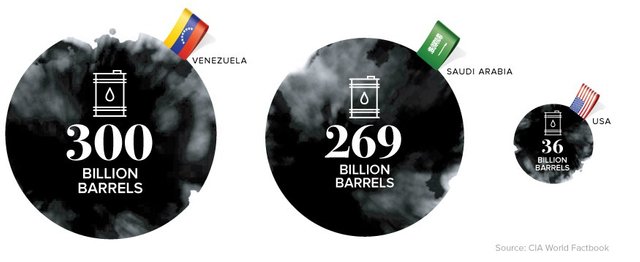
After the discovery of oil in the early 20th century, the nation quickly built its economy on back of black gold – and even today, Venezuela leads the world in proven oil reserves...
By 1950, as the rest of the world was struggling to recover from World War II, Venezuela had the fourth-richest GDP per capita on Earth. The country was 2x richer than Chile, 4x richer than Japan, and 12x richer than China!
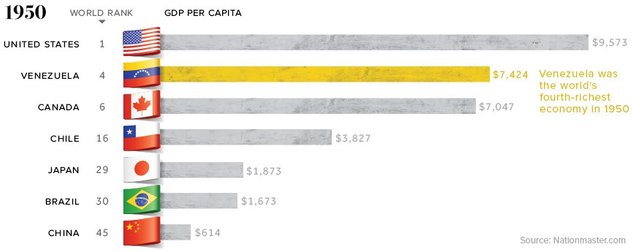
Unfortunately for Venezuela, this wealth wouldn’t last – and an over-reliance on oil would soon decimate the economy in unexpected ways.
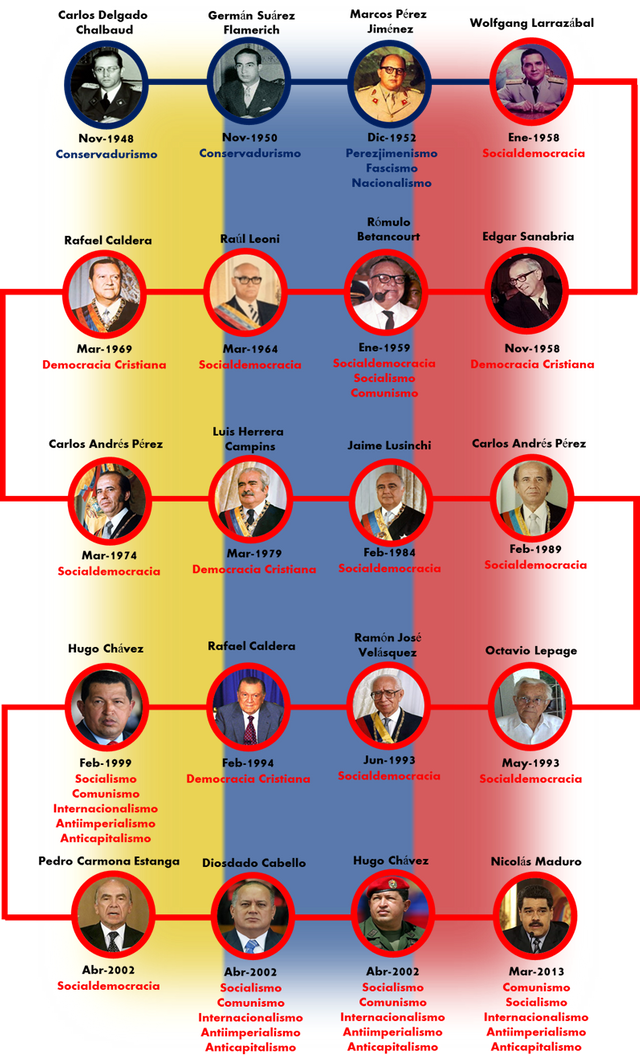
Although in the decades between 50 and 80 the country would achieve a sustained growth, soon the errors would begin.
By 1982, Venezuela was still the richest major economy in Latin America. The country used its vast oil wealth to pay for social programs, including health care, education, transport, and food subsidies. Workers in Venezuela were among the highest paid in the region.
However, as you’ll see in the following animation, from there things went quickly downhill. In the mid-1980s, an oil glut and a free-falling oil price ended up decimating the Venezuelan economy, which was unable to diversify away from energy.
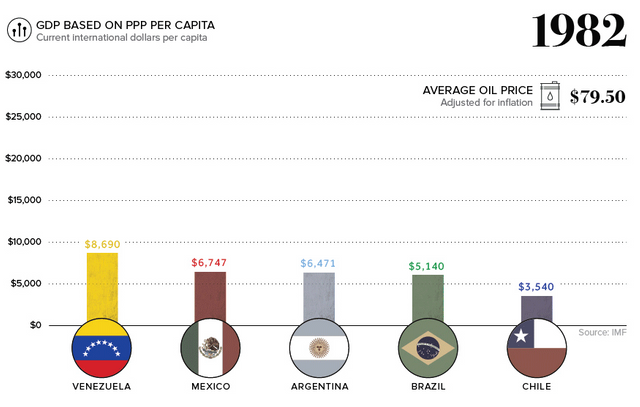
Today, Venezuela has one of the poorest major economies in Latin America – and as the current crisis rides itself out, the IMF foresees it getting far worse. By 2022, the organization predicts Venezuela’s GDP per capita (PPP) will be just $12,210, which would be a massive economic setback – the Venezuelan economy would be even poorer than it was many years before the Chávez era started.
The Venezuelan economy and instability go hand in hand, since 95% of exports are represented by oil, a small fluctuation, a slight rise or fall in prices or demand may cause the economy to fall.
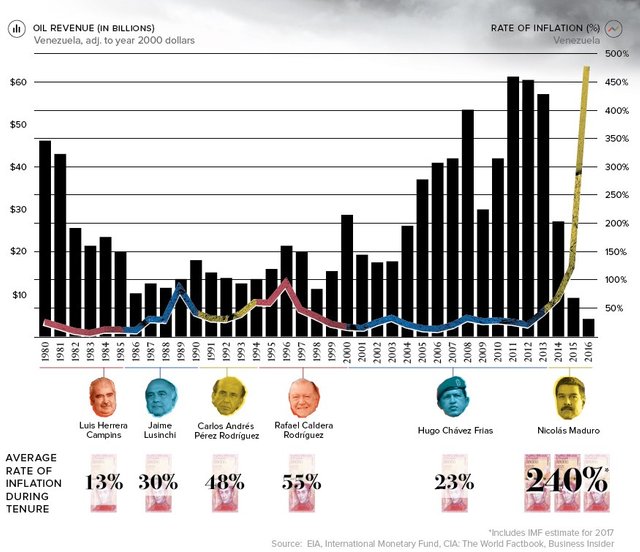
After the oil glut in the 1980s, Venezuela’s oil revenues dropped significantly. It was then that Venezuela had its first bout with inflation, where rates peaked in 1989 (84.5% inflation) and later in 1996 (99.9% inflation). Without sufficient money coming in, the country had to rely on its printing presses in an attempt to maintain living standards.
In 1998, Hugo Chávez was elected with the promise that Venezuela could reduce poverty and step up living standards by leaning even more heavily on its energy wealth. The recovery of oil prices helped this come true in the 2000s, and Chávez later passed away in office in 2013.
Since the arrival to power of Hugo Chavez many indexes began to shoot through the skies; oil revenues rose, so did the purchasing power of the poorest people, and social programs multiplied. But in turn, other not-so-pretty figures soared, such as corruption, crime and scarcity.
The solutions that the socialist government had for the problems were very simplistic and really ended up being another problem, for a long time, with the abundance of oil revenues, the solution to all problems was subsidies:
If there was unemployment then public companies began to hire, even if they did not have vacancies, so PDVSA went from having 40,000 employees in 1998 and producing 3.5 million barrels a day, having 140,000 employees today and producing 2.2 million barrels. ex-president Rafael Ramírez came to admit that he did not know what they were doing and what was the formation of 30% of that personnel).
If there was poverty the government did not put people to generate wealth, because we already know its "modus operandi", it is easier to give houses, cars, televisions, telephones, etc., to the people related to the government, and thus also secures their votes.
For in addition to these "solutions", they also wanted to implant a totally socialist model, right?
To all who did not wink at the government, they began to expropriate the companies. The expropriated companies began to sell products at regulated prices by the same government, which did not give a penny in profit margin. Although the expropriated companies could not support themselves, that did not matter, because now PDVSA could keep them all, and thus PDVSA began to finance all public companies. (By the way, when I say expropriation is stealing, since the government has done almost no company the payment of expropriations)
The price control set by the government drowned the private production companies, and these gradually began to disappear.
All this happening, while the Chavistas applauded the popular government.
Nicolás Maduro, who took over after the death of his predecessor, saw oil prices crash almost immediately, and it was clear that Venezuela’s intense battle with inflation was only just beginning. The national currency, the Venezuelan bolívar, would soon be almost worthless.
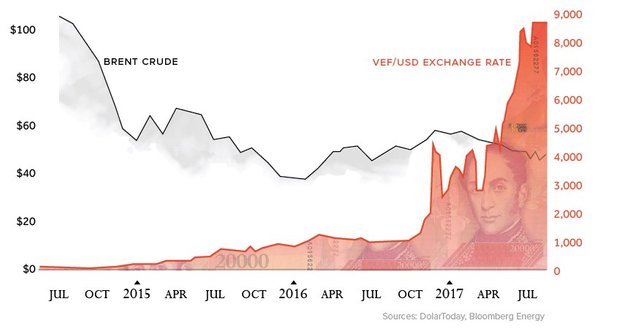
As we learned earlier, the whole country began to rely heavily on petroleum, and when it fell, everything went down the chasm.
The country has massive shortages of food, electricity, and other essential goods, and violence is escalating in Caracas. More recently, the government is attempting to tighten its grip around power, and mismanagement of the economy has led to people starving on the streets. People are calling the situation a humanitarian crisis, which is extremely disheartening to see in what was once one of the richest countries on the planet.
And while the current condition of Venezuela is a tragedy in itself, the country’s inability to live up to its true economic potential is nearly just as devastating.
And so Venezuela moved from prosperity to stagnation and from wealth to poverty.
If you are interested in going deeper into the subject, you can read the complete articles from where you get much of the data and graphs:
http://money.visualcapitalist.com/richer-poorer-venezuela-economic-tragedy/
https://www.forbes.com/sites/rrapier/2017/05/07/how-venezuela-ruined-its-oil-industry/#755ebf7f7399
http://yoyopress.com/2014/09/29/en-10-claves-la-pdvsa-de-1998-vs-la-pdvsa-de-2014/ (In Spanish, but with very revealing data)
Excellent info! People really need to understand this stuff! Thank you!
that's right, thanks for commenting!
They also owe alot of debt to china and in the agreement china wanted to be paid in oil and the argentinians were happy about that until the price of oil collapsed.
Even when the flow of capital for oil was so abysmal, the government managed to get into debt.
In short, socialism brought us here. I think it's time to give way to the Free Market and Libertarianism
In short, but there is also a lack of change in the mentality of people, the transition that Venezuela needs to recover more than a simple political change.
Nice article!
It would be great if Noble Laureate in economics Paul Krugman could read this!👌🤣
We have many professors who advocate and support socialism. Maybe we should force to emigrate to Venezuela. 👍🐸
That's right, there are many people in the academic field who defend socialism, or what they believe is socialism, which in practice is nothing more than misery.